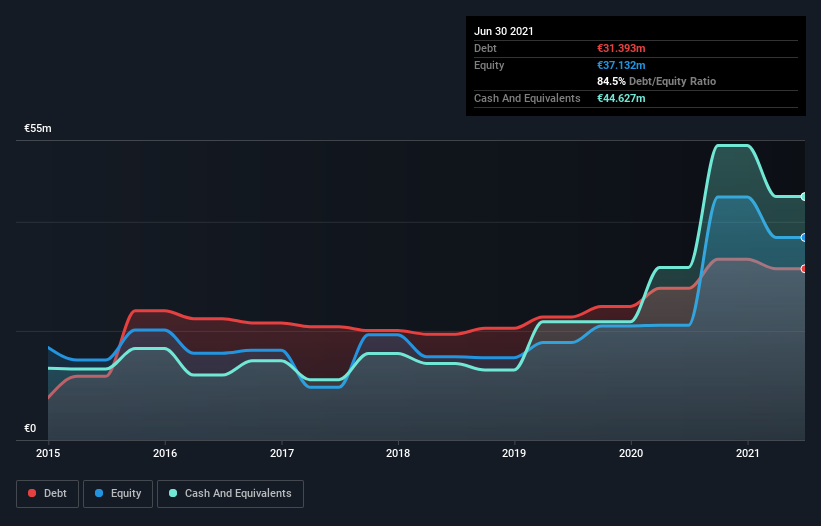Health Check: How Prudently Does Expert.ai (BIT:EXAI) Use Debt?
Howard Marks put it nicely when he said that, rather than worrying about share price volatility, 'The possibility of permanent loss is the risk I worry about... and every practical investor I know worries about.' So it seems the smart money knows that debt - which is usually involved in bankruptcies - is a very important factor, when you assess how risky a company is. We note that Expert.ai S.p.A. (BIT:EXAI) does have debt on its balance sheet. But the real question is whether this debt is making the company risky.
What Risk Does Debt Bring?
Debt assists a business until the business has trouble paying it off, either with new capital or with free cash flow. Part and parcel of capitalism is the process of 'creative destruction' where failed businesses are mercilessly liquidated by their bankers. However, a more frequent (but still costly) occurrence is where a company must issue shares at bargain-basement prices, permanently diluting shareholders, just to shore up its balance sheet. Of course, the upside of debt is that it often represents cheap capital, especially when it replaces dilution in a company with the ability to reinvest at high rates of return. The first step when considering a company's debt levels is to consider its cash and debt together.
Check out our latest analysis for Expert.ai
What Is Expert.ai's Net Debt?
The image below, which you can click on for greater detail, shows that at June 2021 Expert.ai had debt of €31.4m, up from €27.8m in one year. But on the other hand it also has €44.6m in cash, leading to a €13.2m net cash position.

How Healthy Is Expert.ai's Balance Sheet?
According to the last reported balance sheet, Expert.ai had liabilities of €21.1m due within 12 months, and liabilities of €34.0m due beyond 12 months. On the other hand, it had cash of €44.6m and €21.6m worth of receivables due within a year. So it can boast €11.1m more liquid assets than total liabilities.
This short term liquidity is a sign that Expert.ai could probably pay off its debt with ease, as its balance sheet is far from stretched. Simply put, the fact that Expert.ai has more cash than debt is arguably a good indication that it can manage its debt safely. The balance sheet is clearly the area to focus on when you are analysing debt. But it is future earnings, more than anything, that will determine Expert.ai's ability to maintain a healthy balance sheet going forward. So if you're focused on the future you can check out this free report showing analyst profit forecasts.
Over 12 months, Expert.ai reported revenue of €37m, which is a gain of 4.1%, although it did not report any earnings before interest and tax. That rate of growth is a bit slow for our taste, but it takes all types to make a world.
So How Risky Is Expert.ai?
Statistically speaking companies that lose money are riskier than those that make money. And we do note that Expert.ai had an earnings before interest and tax (EBIT) loss, over the last year. Indeed, in that time it burnt through €16m of cash and made a loss of €12m. While this does make the company a bit risky, it's important to remember it has net cash of €13.2m. That means it could keep spending at its current rate for more than two years. Overall, its balance sheet doesn't seem overly risky, at the moment, but we're always cautious until we see the positive free cash flow. There's no doubt that we learn most about debt from the balance sheet. But ultimately, every company can contain risks that exist outside of the balance sheet. For instance, we've identified 3 warning signs for Expert.ai that you should be aware of.
Of course, if you're the type of investor who prefers buying stocks without the burden of debt, then don't hesitate to discover our exclusive list of net cash growth stocks, today.
Valuation is complex, but we're here to simplify it.
Discover if Expert.ai might be undervalued or overvalued with our detailed analysis, featuring fair value estimates, potential risks, dividends, insider trades, and its financial condition.
Access Free AnalysisThis article by Simply Wall St is general in nature. We provide commentary based on historical data and analyst forecasts only using an unbiased methodology and our articles are not intended to be financial advice. It does not constitute a recommendation to buy or sell any stock, and does not take account of your objectives, or your financial situation. We aim to bring you long-term focused analysis driven by fundamental data. Note that our analysis may not factor in the latest price-sensitive company announcements or qualitative material. Simply Wall St has no position in any stocks mentioned.
Have feedback on this article? Concerned about the content? Get in touch with us directly. Alternatively, email editorial-team (at) simplywallst.com.
About BIT:EXAI
Expert.ai
An artificial intelligence (AI) platform company, develops and sells cognitive computing software products based on AI algorithms to read and understand written language worldwide.
Excellent balance sheet with reasonable growth potential.
Market Insights
Community Narratives


Recently Updated Narratives


MINISO's fair value is projected at 26.69 with an anticipated PE ratio shift of 20x


The Quiet Giant That Became AI’s Power Grid


Nova Ljubljanska Banka d.d will expect a 11.2% revenue boost driving future growth
Popular Narratives


The company that turned a verb into a global necessity and basically runs the modern internet, digital ads, smartphones, maps, and AI.


MicroVision will explode future revenue by 380.37% with a vision towards success



